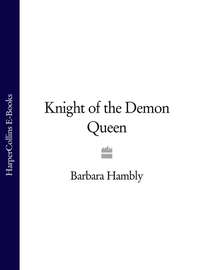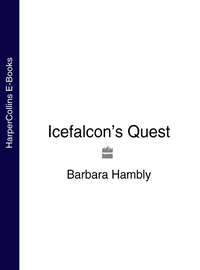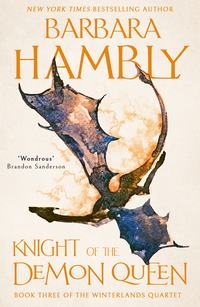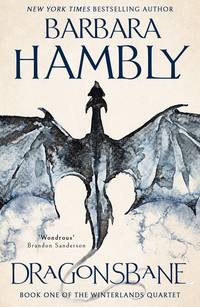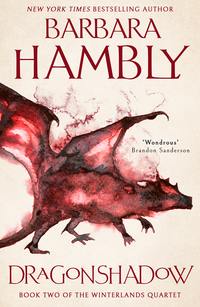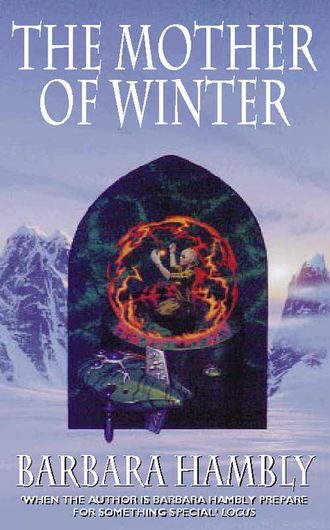
Полная версия
Mother of Winter
Him.
“They sent a wizard up to find him?” Rudy was frequently asked to search the back corners of the Keep, or the woods, for straying children.
They ascended a stair near the enclave owned by Lord Sketh and his dependents, a wooden one crudely punched through a hole in the ceiling to join the House of Sketh’s cells on the third level with those on the fourth. Warm air breathed up around them, rank with the pungence of cooking, working, living, drawn by the mysterious ventilation system of the Keep.
One more point for the wizards who built the place, Rudy thought. However they’d powered the ventilator pumps and the flow of water, most of them still worked. He and Ingold had never been able to ascertain that one to their satisfaction. They’d found the pumps, all right, and the pipes and vents like capillaries through the black walls, the thick floors, but no clue as to why they still worked.
A young boy passed with two buckets of water on his shoulders, accompanied by a henchman wearing the three-lobed purple badge of the House of Sketh—Sketh was notorious for thinking it owned the small fountain in the midst of the section where most, but not all, of its servants and laborers lived. Alde suspected they were charging for access, but couldn’t prove it.
“Uh-huh,” Tir said. “There were three wizards in the Keep then, an old man and a lady and a little girl. The girl found the little boy.”
“So these were different from the guy who showed the King how to find the potatoes.”
Tir thought about this. “Uh-huh. That was … I think the King was before. Way before.” It was the first time he’d identified anything resembling a sequence to his memories. Eldor—Tir’s dead father—had had some of Dare of Renweth’s memories, toward the end of his pain-racked life; according to Ingold, few others of the line had. Ingold deduced that the wizards who built the Keep had engineered such memories into certain bloodlines to make sure of their preservation, but it was never possible to predict who would remember what, or when.
The boy frowned, fighting to reach back into that barely comprehended darkness, and they turned a couple of corners and cut through a quarter-cell somebody had chopped into a corridor: Tir still leading, still pursuing old recollections, matching in his mind the way the Keep had been three thousand years ago against the shortcuts of his current experience.
“There’s stairs way back there but we can go up here,” he said, pointing down another hall.
Here, toward the back of the fourth, many of the fountains had failed. The cells were inhabited by the Keep’s poorer folk, who’d received less productive land in the division of arable allotments or whose birthrate had outstripped what they were assigned; those whose land had been damaged by slunch or whose livestock had sickened and died; those who had sold, traded, or mortgaged first their land, then their time and freedom, to the wealthier inhabitants who had food to spare. Many of the cells, lying far from the stairways or the bridges that crossed the Aisle, weren’t inhabited at all. Around here the air smelled bad. It was all very well to be living in a place whose ventilation pumps were still operative after three thousand years, but over the millennia, as Rudy put it, somebody had lost the manual. When a pump broke, it stayed broken.
Rudy hadn’t mentioned it to Alde, but he lived in fear that a lot of this stuff would all give out at the same time, as the internal combustion engines of his experience generally had. And then Shit Creek won’t even be the phrase for it, he thought uneasily.
Toward the back of the Keep the corridors lay straighter, too, for no one had lived here long enough to alter the walls. The darkness seemed denser away from the pine-knot torches, the lamps of smoking grease, and the occasional glowstone in its locked bracket of iron.
The stairway Tir led him to was at the back of the fourth, a deserted area smelling of the rats that seemed to spontaneously generate in spite of all the purging-spells he or Ingold could undertake. Without the blue-white glow that burned from the head of Rudy’s staff, the long corridor would have been as lightless as the crawl spaces behind Hell. A smoke-stained image of a saint regarded them gloomily from a niche at the stair’s foot: St. Prool; Rudy recognized her by the broken ax she held in her hands.
He’d never figured out, when Gil told him the story, why God had broken the ax in half after ol’ Proolie got the chop. The blood line around her neck was neatly drawn in red, like a sixties choker.
The stairs themselves were rough plank, almost as steep as a ladder. Tir darted ahead, feet clattering on the wood, and Rudy cast his magic before him so that a ball of witchlight would be burning over the child’s head when he got to the top.
He himself followed more slowly, thrusting his glowing staff-head up through the ragged hole in the stone ceiling to illuminate the cell above. The magelight was bright, filling the little room and showing Rudy, quite clearly when he came up level with the floor, the thing that stood in the cell’s doorway.
It was a little taller than his knee, and, he thought—trying to summon the image of it in his mind later—a kind of dirty yellowish or whitish-yellow, like pus except that there was something vaguely inorganic about the hue.
It had a head but it didn’t have eyes, though it turned the flattened, fist-sized nodule on its spindly neck in his direction as he emerged. It had arms and legs—afterward Rudy wasn’t sure how many of each.
He was so startled he almost fell, lurching back against the stone edge of the opening in the floor. He must have looked away, grabbing for his balance on the ladder, because when he looked back it was gone.
“Tir!” Rudy lunged up the last few rungs, flung himself at the door. “Tir, watch out!” He almost fell through the doorway, the blast of light he summoned flooding the corridor, an actinic echo of his panic and dread.
He looked left, then right, in time to see Tir emerge, puzzled, from another cell door perhaps fifty feet down the hall.
There was no sign of the thing he’d seen.
CHAPTER THREE
“Stay there!”
Tir looked scared—by the panic in Rudy’s tone as much as by anything else—and held on to the jamb of the doorway in which he stood, while Rudy summoned all the light he could manage. By that brilliant, shadowless wash Rudy checked every cell for fifty feet down the corridor, quick looks, loath to turn his back on the passage or on the other empty black openings. Most cells here were bare, scavenged long ago of everything remotely useful—boxes had been stripped of their metal nails, old barrels of their strapping, even the curtains or the rickety shutters that in other places in the Keep served to cover the openings. Here and there Rudy found a cell crammed, disgustingly, with the waste and garbage some family on five north thought Minalde’s quaestors wouldn’t notice.
Rudy stretched his senses out, listening, trying to scent above the overwhelming garbage stink. But his concentration wasn’t what it should have been. Thinking back, he recalled no odor connected with the creature, nor any sound, not even when it fled.
“Maybe it’s a gaboogoo,” Tir surmised, when Rudy returned to the boy at last. “They’re sort of fairy things that live in the forest and steal milk from cows,” he added, with the tone of one who has to explain things to grown-ups. “Geppy’s mama tells neat stories about them.”
Some of Ingold’s lore concerned gaboogoos, and they almost certainly didn’t exist, though legends of them persisted, mostly in the southeast. But in any case, according to most of those legends, gaboogoos were humanoid: blue, glowing, and “clothed as richly as princes,” a description that made Rudy wonder where they and similar fairy folk purchased size minus-triple-zero petite doublets and gowns. Same place superheroes order those nonwrinkle tights from, I guess. On the other hand, of course, he hadn’t believed in dragons, either, until he’d been attacked by one.
“Whatever it is, it sure as hell isn’t supposed to be here.” Rudy looked around him uneasily, then down at the boy again. As the first shock and alarm wore off, the implications were coming home to him. Something was living in the upper reaches of the Keep. Something he’d never seen, had never heard of—which probably meant Ingold had never heard of it, either. The old man had sure never mentioned weird little eyeless gremlins to him. And that meant …
Rudy wasn’t entirely sure what it did mean, except that it meant big trouble somewhere. “I think it’s time we got you home, Ace.” He took Tir’s hand.
“But you said it was smaller than me,” Tir protested. “And it didn’t have a mouth or teeth or anything. And I want to see it. Maybe it’s got a treasure.”
“Maybe it’s got claws,” Rudy said firmly, leading the way back toward the cell where the steps descended. Oddly, he couldn’t remember whether it had or not. “Maybe it’s got great big long skinny fingers to strangle you with.”
Maybe it’s got a big brother. Or lots of big brothers.
“But what about the … the earth-apples, the potatoes?” Tir pronounced the word carefully, and with a good imitation of Rudy’s clipped California accent. “If you’ve got to go to the River Settlements with Master Graw tomorrow, we won’t be able to look for them for days.”
“If they’ve kept for a couple thousand years, they’ll keep for another three, four days.” Rudy glanced behind him at the corridor as they entered the cell where the stair led down. His concentration had not been up to maintaining the full white magelight for more than a few minutes, and it had faded and shrunk around them until it was once more two smoky stars on the points of the metal crescent that topped his staff. “Besides, I’ll be damned if I’m leaving this place till I figure out what’s going on, Master Graw or no Master Firetrucking Graw.”
He held the staff down through the hole that led back to the fourth level, to make sure the cell below was empty and safe, and watched Tir carefully as the boy climbed down. In the few seconds that took, he also managed to glance over his shoulder at the cell doorway behind him seven or eight or maybe ten times.
He hadn’t realized how much, in the past five years, he had taken for granted the safety within the walls of the Keep.
“You’re sure it wasn’t an illusion?” Ingold asked a short time later.
Rudy considered the matter, propping his shoulders against the dyed sheepskins, bison pelts, and pillows of knit-craft and leather that made homey the pine-pole bench in the big workroom on first south that he and Ingold shared.
“I dunno,” he said at length. He tilted the scrying crystal in his hand so that the older wizard’s image, tiny but clear, shone more brightly in the jewel’s depths. By the look of it, the old man was in a ruined villa at Willowchild, four or five days’ journey from Renweth Vale.
The sight filled him with relief. He didn’t feel capable of dealing with what he’d seen earlier that evening—or what he thought he’d seen.
“I’m usually pretty good at spotting an illusion,” he went on slowly. “And this didn’t feel like one.” At the other end of the bench, Alde curled up like a child, her feet tucked under her green wool gown and her long black hair loosened for sleep, as it had been when he and Tir had come in to tell her what he had seen. Despite the lateness of the hour—the Keep was settling into somnolence around them—the boy was wide-awake, watching Rudy’s end of the conversation with vivid interest.
“It didn’t have a sound or a smell to it. Pugsley and I were looking for stuff the old guys hid … And hey, you know what? The Guy with the Cats, from the record crystals? He was the one Tir remembered seeing in the Keep all those years ago! He described him perfectly. So we know when he lived! But Tir didn’t see squat, did you, kid?”
“Not squat,” the boy affirmed. Though he had demonstrated an almost preternatural ability to separate the formal intonations of proper speech from the combination of peasant dialect and barrio slang that Rudy and most of the herdkids spoke, Alde rolled her eyes.
“Hmm,” Ingold said and scratched a corner of his beard. Rudy had been half hoping the older wizard would say, Oh, THOSE eyeless, rubbery, mysterious critters, but at least he hadn’t blanched, clutched his heart, and cried, Dear God, stay together and barricade the doors! either.
“Well, we can’t rule out that it was an illusion,” Ingold finally said. “And considering the stringency with which the Guards protect the Doors, and the spells of Ward written over the steps, the doorposts, and the inner and outer doors themselves, it’s difficult to see how something could have gotten in, though of course that doesn’t mean it didn’t. The Ward captains at the back end of the fifth aren’t going to like it much—Koram Biggar and Old Man Wicket and the Gatsons have been raising chickens illegally up there, and never mind what it does to the rat population of their neighbors’ cells—but I think you need to have the Guards make a thorough sweep.”
He considered the matter a moment, his sharp blue eyes distant with thought, then added, “Tell them to take dogs.”
The Guards swept that night. And the Guards found nothing. It was after midnight when they began their search, and it was not a popular one. They swept the fourth level and the fifth, back away from the inhabited regions around the Aisle, where the corridors lay straight and cold and uncompromising far from the water sources and curled tight and thick where they had been, or still were, perhaps. They questioned those who lived there about things seen or smelled or found, and heard no word of strange droppings, or food missing, or odd or unwarranted smells.
Not that one could tell in some places, Rudy reflected dourly, and there was trouble, as Ingold had predicted, with the Biggar clan, and the Browns, and the Gatsons, and the Wickets, and others who resented being taken to task for their disregard of Keep health regulations. “Hell, it ain’t botherin’ no one!” protested Old Man Gatson, a sour-faced patriarch whose family occupied the least desirable tangle of cells on fifth north—least desirable because there was no waste disposal for many hundred feet.
“What about the people who live directly underneath?” Janus of Weg demanded, disgusted and exasperated at the sight of the stinking, swarming boxes and jars heaped up in an abandoned cell. “Who get your cockroaches?”
“Pah,” the old man snarled. “It’s Varkis Hogshearer that lives underneath and he can have my cockroaches—and what they live off, too! Twenty-five percent he charged me for the loan of seed wheat—twenty-five percent! He’s lucky I don’t—”
“That’ll be enough of that,” the commander snapped, while Rudy and the Icefalcon drifted silently down the corridor toward the empty darkness beyond the Gatsons’ warren, listening. Up here, away from the thick-settled regions of the Keep, Rudy sensed the ghosts of old magic in the smooth black stone of the walls. Magic that had defeated the Dark Ones; magic that turned the eyes of ordinary folk aside. Magic that did things Rudy could not identify. But he could feel it as he might feel cold or heat, a kind of magnetism, a tingling in his fingertips or a sense that someone stood quite close beside him whispering words in a language he could not understand.
Wizards had raised the Keep. Their laboratory still existed, deep in the crypts near the hydroponics chambers. Of the great machines that had been made and stored there, nothing remained but scratches and stains on the floor—what had become of them, Rudy hated to think. Smaller, largely incomprehensible equipment of gold and glass and shining tubes of silver had been found, hidden when the old mages themselves had vanished. Echoes of their spells lingered in places: in addition to selected cells in the Church sector, where no magic whatsoever would work, there was a cell on second north where Rudy’s powers, and Ingold’s, were sometimes magnified, sometimes disturbingly randomized, so that spells had different effects from those intended, and a Summoning would frequently result in the appearance of something appallingly other than that which had been called. Ingold had found a three-foot-long section of corridor on fifth south where he could speak in a whisper and Rudy, if he stood at a particular spot in the third level of the crypts, could hear every word.
There was a room in the crypts that would kill any animal, except a cat, that walked into it—including the one human being who had tried it—and a corner of what had been a chamber on third south where from time to time letters would appear on the wall, smudgily written in light as if traced with someone’s fingertip, spelling out words not even Ingold understood. The corner had been bricked off from the main cell in a subsequent renovation—the main cell itself was currently used as a store-room.
So why couldn’t the Guy with the Cats have guarded his bewitched potatoes with visions of little eyeless gremlins?
Rudy didn’t think so, however.
Arms folded, he probed at the sunless silence, listened deeply into the chambers all around him and down that empty hall, tracking the footfalls of the Guards as they carried their torches and glowstones from doorway to doorway. Grimy streaks of yellowish light marked flea-ridden curtains or shutters with broken slats. Skinny men and women, feral children with hungry eyes, came to the doors of cells, resentful at being waked and asked, “Any food missing? Anything disturbed, prints … Cats afraid? Any places the children have spoken of as wrong, or odd?”
“No, sir … No, sir. Why, my Jeddy, she been all over this level like it was her own warren. She’d have let me know soon enough if there was suthin’ amiss in the corners in the dark. You tell the man, Jeddy.”
The statue of an enormously plump saint in a chalky, yellowy-white robe smiled beneficently from a niche between two tallow candles, and Rudy felt uneasy, filled with a sense of looking at clues he did not understand.
Ingold sat for a long time after Rudy ceased speaking—after Gil presumed that Rudy had ceased speaking, for she could hear nothing of what Ingold heard when he used the scrying crystal—turning the two-inch shard of yellowish quartz over and over in scarred, thick-muscled fingers, firelight honeying the white hairs that dusted their backs. Outside the villa’s crumbling walls Gil could hear the far-off ululations of wolf-talk, and nearby, Yoshabel the mule stamped and laid back her ears, her eyes green-gold mirrors of brainless malice.
Waking to the sound of Ingold’s voice, Gil had for a time been so overwhelmed with rage at him, so filled with the conviction that the throbbing agony in her face and all the sorrows in her life were his doing, that she had had to close her hands around a broken projection of marble in the packed earth near her blankets and stare at the dim pattern of firelight among her knuckle bones until the anger went away.
For no particular reason, she thought of Sherry Reinhold, the beautiful blond, tanned, aerobics-perfect classmate who’d been one of the few to be friendly with her in high school. Sherry had become an airline stewardess and had married a dentist and acquired a house the size of one of the smaller campus buildings. Meanwhile, Gil herself was still struggling with the poverty and frustration of the UCLA graduate program in medieval history.
She remembered Sherry sitting across from her at the Bicycle Shop Café in Westwood, saying, “I don’t know why I do it. I don’t even like the taste of alcohol. I know getting drunk isn’t going to solve anything, or help anything, or do anything but screw me up worse. And then I’m sitting there with eleven empty glasses in front of me telling some man I’ve never seen before my telephone number and the directions to my house.” That had been after the divorce. “It’s like the words ‘Oh, have another one’ come out of the empty air, not connected to anything—not the past or the future or anything real—and it’s the rightest and sanest and most sensible thing in the universe. I have to do it.”
Kill him. Kill Ingold.
The rightest and most sensible thing in the universe.
She closed her eyes. Wondered what she had dreamed—about her mother and sister?—that had made her at once angry and convinced that nothing she would ever do would bring her happiness again.
Though she had spoken to him of the dreams, of the terrible urgings that swamped her mind, he had refused to bind her hands. “You may need your weapons, my dear, at any moment,” he had said. “And I trust you.”
“You shouldn’t.” They were standing under the dying sycamore tree in the courtyard where she had first been attacked, looking down at the ripped sack that lay on the ground. It contained what little was left of the thing that had attacked her, torn down and chewed by vermin as if no spells had been placed upon it, as if no Wards had ringed the tree.
“Then I trust myself,” he had said, picking up the maggoty hindquarter and stowing it—and the remains of the original bag—in another sack pulled from Yoshabel’s numerous packs. “Whatever it is that is driving you to assault me, if it can quicken your timing and get you out of the lamentable habit of telegraphing your side lunges, I’d like to meet it.”
He’d smiled at her—with Ingold as one of her sword-masters, she could take on almost any of the other Guards and win—and Gil responded to his teasing with a grin and a flick at him with the pack rope. Even that small and playful assault he’d sidestepped as effortlessly, she knew, as he would have avoided a lethal blow.
“Thoth?” she heard Ingold say softly now. “Thoth, can you hear me? Are you there?”
She turned her head and looked. A slice of amber light lay across one scarred eyelid and down his cheekbone, refracted from the crystal in his hand. His brows, down-drawn in a bristle of fire-flecked shadow, masked the sockets of his eyes.
“Has that ever happened before?” she asked. “Before last week, I mean?”
He raised his head, startled. “I’m sorry, my dear, did I wake you? No,” he answered her question, when she signed that it didn’t matter. “And the troubling thing is, I’ve frequently had the sensation that Thoth—or one of the other Gettlesand wizards—is trying to signal me, but for some reason cannot get through.”
He got up from his place by the fire, crossed the room to her, a matter of two or three steps only. The former library was one of the few remaining chambers with four walls and a roof, though the wooden latticework of the three wide windows had been broken out. Wickering ember-light revived the velvety crimson memory of the frescoes on the wall, lent renewed color to the faces of those attenuated ghosts acting out scenes from a once-popular romance.
She curved her body a little to make room, and Ingold sat beside her, still turning the crystal in his hand. “I had hoped,” he went on quietly, “that if Rudy could get through to me I would be able to get through to Thoth, but that doesn’t seem to be the case. There’s only a deep sense of … of pressure, of heat, like a river far beneath the earth. Like a rope pulled taut and about to snap.” He put the crystal away and sat silent for a time, gazing at the broken window bars and toying one-fingered with a corner of his beard.
“What did Rudy have to say?”
Ingold told her. At his description of the thing Rudy called a gaboogoo, she was seized with the flashing sensation of familiarity, a tip-of-the-tongue impression that she had seen such a thing, or dreamed about it, but the next instant it was gone. Her dreams had been strange, and even deeper than the urge to hurt Ingold, to destroy him, was the reluctance to speak to him of the things she saw in them … And indeed, when she tried to frame those bleak, fungoid landscapes of pillowlike vegetation, the amorphous, shining shapes that writhed through it or flopped heavily a few feet above its surface, the very memory of those visions dissolved and she couldn’t recall what it was that she had seen.


